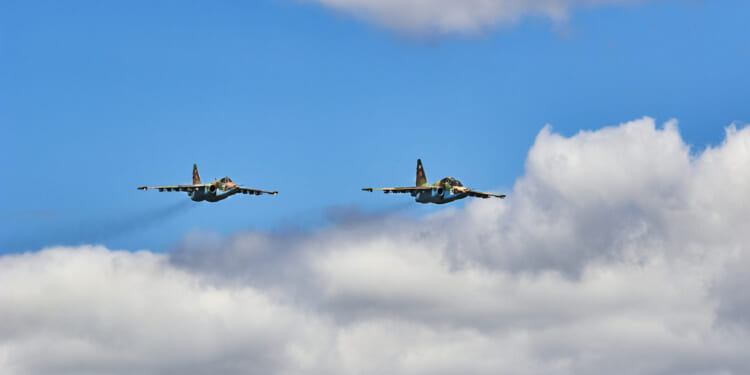The Russian fighters that briefly entered Estonian airspace last Friday and the drones that flew into Polish and Romanian airspace earlier are very unlikely to have been an accident, but they were not an “attack.” The drones were unarmed decoys, nobody was hurt, and the only damage was done when one was shot down by Polish air defenses.
They may have been intended as a test of those defenses; they were almost certainly intended as a warning—a warning above all against British and European plans to deploy a “reassurance force” to Ukraine after a peace settlement. This has been repeatedly and categorically rejected by the Russian government, but continues to be urged by some European governments with a blind determination that suggests that, rather than making a contribution to peace, they are actually interested in blocking any viable peace settlement.
As for the Russian fighters that entered Estonian airspace on September 19, Western media reporting has given the impression that they flew over Estonia itself. They did not. They deviated by a maximum of about five miles from their internationally recognized route over the sea along the middle of the Gulf of Finland. They continued flying parallel to that route but close to it for about 12 minutes before reentering it. This has not stopped wilder elements in the West from suggesting that the next time this happens NATO should shoot them down.
In normal circumstances, or between countries with normal relations, this “incident” would hardly even be worth reporting. The planes were on their way from St. Petersburg to the Russian exclave of Kaliningrad. Amid all the resulting NATO anxiety, it would be nice if someone reflected that it might have been a good idea for NATO to think about the risks of this before extending membership to the Baltic States and isolating Kaliningrad from Russia. (Relatedly, it is essential that NATO countries think about the risk of Russian military retaliation before deciding to intercept ships from Russia’s shadow fleet in international waters, for this would in effect blockade Russian trade from the Baltic and cut off Kaliningrad by sea—something that under international law constitutes an act of war, and to which Russia would almost certainly respond with armed force.)
Concerning the plan for a European “reassurance force” for postwar Ukraine, Finland’s President Alexander Stubb told the Guardian this weekend that future security guarantees to Kiev by a European “coalition of the willing” would compel participating countries to fight Russia if Russia attacked Ukraine again, for “that is the idea of security guarantees by definition.” He added that “security guarantees in essence are a deterrent. That deterrent has to be plausible and in order for it to be plausible it has to be strong.” Stubb echoed the British prime minister Keir Starmer and other leaders in saying that for this, guaranteed U.S. support would be essential.
It is to be presumed that, when making this statement, Stubb was in possession of the following facts: Every major NATO government, including the former Biden administration, publicly and repeatedly ruled out going to war with Russia over Ukraine; the “commitments” made by European countries to the proposed “reassurance force”—including those of Finland—have been of the vaguest kind; not merely have Germany, Poland and other countries categorically and repeatedly ruled out contributing troops, but even the British government is now thinking only in terms of a contribution in the air and at sea; European publics are deeply divided on the issue; Russia’s President Vladimir Putin has stated that any European troops in Ukraine would be considered “legitimate targets”; per Stubb himself, American backing is both essential and uncertain, as the extent of Trump’s readiness to back such a force remains highly unclear; and, finally, such a European force and American backing for it would have to be for the indefinite future, even while the future of the Transatlantic Alliance itself is in question.
Subscribe Today
Get daily emails in your inbox
All this being so, one might logically assume that Stubb’s unstated goal in this interview must have been to get his fellow leaders to abandon the idea of a reassurance force. Yet this may be too charitable an assessment of Stubb’s capacity for logic; for he went on to add that “Russia has absolutely no say in the sovereign decisions of an independent nation state … So for me it’s not an issue will Russia agree [to the reassurance force] or not. Of course they won’t, but that’s not the point.”
I have heard this statement parroted by officials in Brussels and a range of western European capitals; and if they actually believe it, there is reason to doubt not just their honesty but their sanity. A war resulting in more than 100,000 Ukrainian dead tells us that Russia does indeed have a say in Ukraine’s decisions, if Moscow considers them threats to Russian security. Do the people who say this really think that the U.S. “has no say” in the security decisions of Central American countries, or can be persuaded not to exert that say by respect for their “sovereign decisions”? Is that what the history of the past century and more tells us?
Instead of trying to trap the U.S. into a commitment to Ukraine involving the permanent risk of war with Russia—with all the long-term dangers and costs to the U.S. that would follow—European governments should be steadily and sensibly building up the defenses of NATO within its existing borders while at the same time developing a viable peace settlement by which Russia would abandon its impossible demands to Ukraine in return for a new European security architecture guaranteeing Russia’s own legitimate security interests. Of such European thinking, however, there is at present very little sign.












